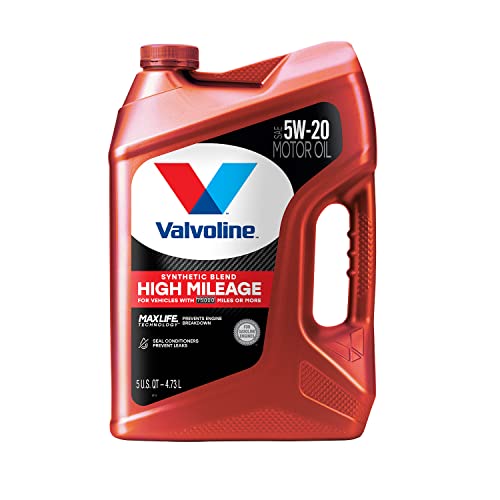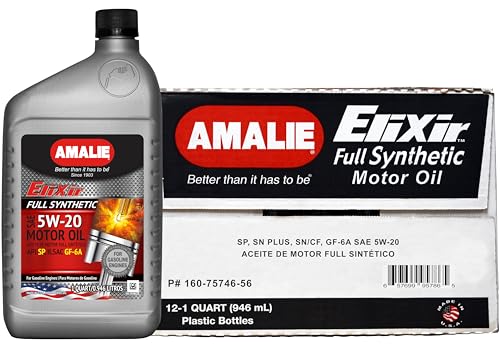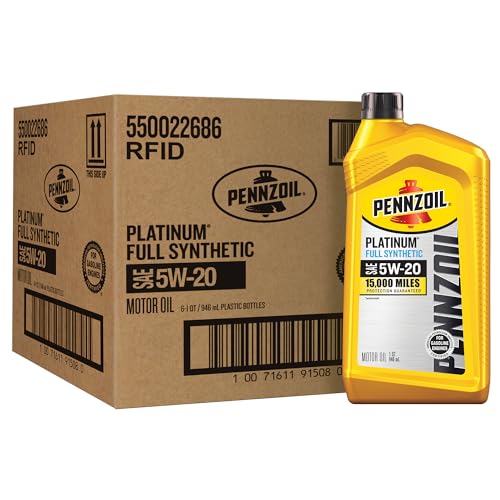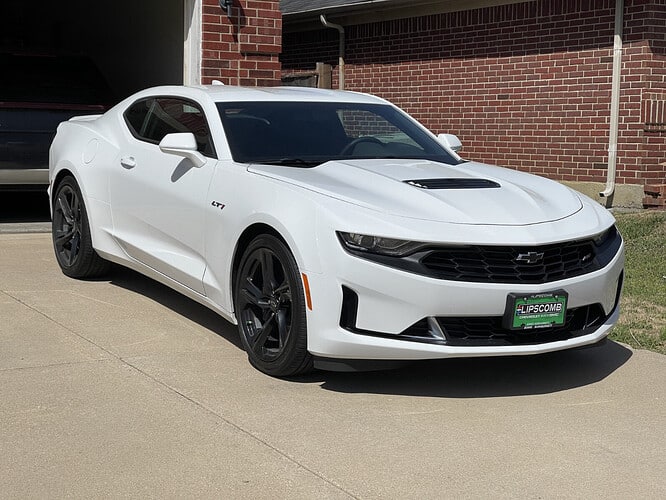The 2013 Chevy Malibu is a stylish and comfortable midsize sedan that offers a smooth ride and an array of impressive features. The Malibu caters to different driving needs and preferences with various engine options, including a 2.0L L4 AWD, 2.0L L4 FWD, 2.4L L4, and 2.5L L4 engine. As a 2013 Chevy Malibu owner, it is essential to understand your vehicle’s maintenance requirements to ensure its longevity and optimal performance.
For several reasons, using the correct engine oil type for your 2013 Chevy Malibu is crucial. First, it ensures that your engine operates at its peak performance by providing the necessary lubrication and reducing friction between moving parts. This helps prevent premature wear and tear on engine components, ultimately extending the life of your vehicle.
Second, the right engine oil type helps maintain fuel efficiency, reducing emissions and lowering operating costs. It also helps keep the engine clean by minimizing sludge buildup and other harmful deposits.
Lastly, using the proper engine oil type is essential for maintaining your vehicle’s warranty validity. Failure to use the recommended oil can lead to engine damage, which may not be covered under warranty. Therefore, it is crucial to understand the specifications and viscosity grades suitable for your 2013 Chevy Malibu to maintain its performance and protect your investment.
Recommended Engine Oil Type For The 2013 Chevy Malibu
The DEXOS1 specification is a globally recognized engine oil standard developed by General Motors to ensure optimal performance, efficiency, and engine protection. This specification sets strict requirements for engine oils, including enhanced viscosity control, deposit control, wear protection, and improved fuel efficiency. Engine oils that meet the DEXOS1 specification undergo rigorous testing and must exhibit exceptional performance across various parameters.
By using an engine oil licensed to the dexos1 specification, you can be confident that it is formulated to provide the best protection for your 2013 Chevy Malibu’s engine. This will help maintain the engine’s performance, reduce wear, and prolong the life of your vehicle.
Recommended Viscosity Grades for Each Engine Type
Viscosity is a measure of an oil’s resistance to flow. It is crucial to select the appropriate viscosity grade for your 2013 Chevy Malibu to ensure optimal engine protection and performance. The recommended viscosity grades for each engine type are as follows:
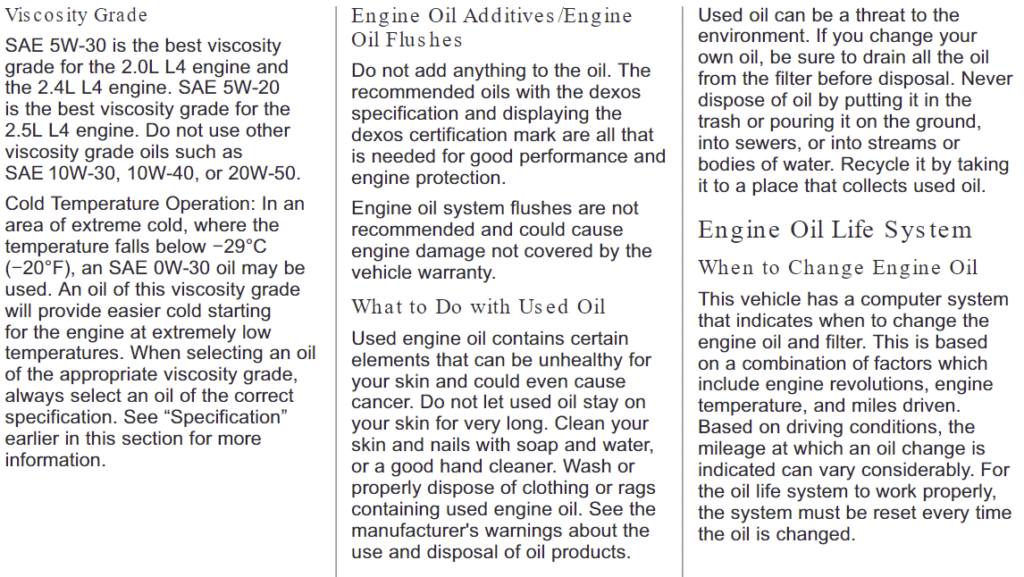
- 2.0L L4 Engine (AWD and FWD) and 2.4L L4 Engine: SAE 5W-30
- 2.5L L4 Engine: SAE 5W-20
Using the recommended viscosity grades ensures that the engine oil provides the necessary lubrication and protection across a wide range of operating temperatures. It is essential not to use other viscosity grades, such as SAE 10W-30, 10W-40, or 20W-50, as they may not provide the proper protection and could result in engine damage.
Cold Temperature Operation Considerations
In areas with extremely cold temperatures, where the temperature falls below -29°C (-20°F), it may be necessary to use a different viscosity grade to ensure easier cold starting for the engine. In such conditions, you may use SAE 0W-30 oil, which is designed to provide better flow at extremely low temperatures.
When selecting an oil with a different viscosity grade for cold temperature operation, always ensure that it still meets the correct DEXOS1 specification to maintain the necessary engine protection and performance. By considering both the recommended viscosity grades and the specific needs of your vehicle in cold temperatures, you can help ensure the long-term reliability and performance of your 2013 Chevy Malibu.
2013 Chevrolet Malibu Oil Capacity
To ensure proper engine lubrication and performance, it is essential to know the correct engine oil capacity for your 2013 Chevy Malibu. The engine oil capacities for each engine type, including the oil filter, are as follows:
- 2.0L L4 Engine AWD. The engine oil capacity for the 2.0L L4 AWD engine is 5.7 liters (6.0 quarts). When changing the oil and filter, be sure to fill it with the appropriate amount of oil to ensure optimal engine performance and protection.
- 2.0L L4 Engine FWD. For the 2.0L L4 FWD engine, the engine oil capacity is 4.7 liters (5.0 quarts). It is crucial to use the correct oil capacity when performing an oil change to avoid overfilling or underfilling, which can lead to engine damage.
- 2.4L L4 Engine. The engine oil capacity for the 2.4L L4 engine is 4.7 liters (5.0 quarts). Maintaining the proper oil capacity ensures that your engine is well-lubricated and operates efficiently.
- 2.5L L4 Engine. The 2.5L L4 engine’s oil capacity is 4.7 liters (5.0 quarts). Always use the recommended oil capacity when changing the oil and filter to ensure your engine’s best performance and protection.
Selecting the Right Engine Oil
When choosing the right engine oil for your 2013 Chevy Malibu, it is essential to look for the DEXOS1-approved certification mark. This mark indicates that the oil has been tested and approved to meet the DEXOS1 specification, ensuring optimal performance, efficiency, and engine protection. Engine oils with the DEXOS1-approved certification mark have undergone rigorous testing and meet the stringent requirements set by General Motors. By using DEXOS1-certified engine oil, you can be confident that you provide the best care for your vehicle and maintain its value over time.
- MaxLife Technology prevents engine breakdown with 40% better wear protection than the industry standard
- Includes seal conditioners to reduce oil consumption and oil leaks in high mileage engines.
- Added detergents reduce sludge, corrosion, rust and deposits to help keep motors clean inside and ensure a smooth-running engine.
- Advanced friction-fighting additives help maximize performance and improve fuel efficiency.
- Engine Protection: Exceptional and Extended Engine Protection in Severe Operating Conditions
- Advanced Technology: Formulated with high quality synthetic base stocks and shear stable viscosity modifier for ultimate performance
- Engine Compatibility: Specifically designed for gas-direct engine (GDI) and turbo gas-direct engine (TGDI) designs
- LSPI Prevention: Contains specialized additive technology to prevent low-speed pre-ignition for enhanced engine longevity
- Mobil 1 advanced full-synthetic motor oil 5W-20 utilizes Mobil 1’s signature Triple Action Formula to deliver outstanding engine performance, protection, and cleanliness.
- Helps protect critical engine parts for up to 10,000 miles between oil changes,* controlling oxidation to prevent oil breakdown and maintaining excellent viscosity
- Meets ILSAC GF-6 standards to help provide low-speed pre-ignition (LSPI) and timing chain wear protection while keeping your engine clean and helping to improve your fuel economy
- Helps extend engine life by working to prevent damaging deposits and sludge buildup
- Full synthetic 5W-20 motor oil that is made with natural gas and designed to maximize engine protection
- Backed by a 15,000-mile protection guarantee* to protect your pursuit of every mile
- Provides better fuel economy (based on the latest industry standards)
- Keeps pistons cleaner than required by the toughest industry standard (based on Sequence IIIH results)
- 6X better wear protection on critical engine parts than industry standards**
- 1.3X better sludge protection than industry standards*
- 3X Stronger against viscosity breakdown than leading full synthetic^
- Protection for 10,000 miles between oil changes
- Designed to help provide protection for your vehicle’s engine
- Licensed to the dexos1 Gen 2 engine oil specification, which is the General Motors’ OEM engine oil specification
- Meets ILSAC GF-5 specifications to fulfill current energy-conserving performance standards
- Meets API SN Service Classification requirements to be suitable for use in modern engines
- GM Discontinued 10-9246 and has been replaced by 10-9329
Consequences of Using the Wrong Engine Oil
Using the wrong engine oil can have several adverse consequences for your 2013 Chevy Malibu:
- Engine Damage: The incorrect oil may not provide adequate lubrication and protection, leading to increased friction, wear, and potential engine damage. This can result in costly repairs or even engine failure in severe cases.
- Reduced Performance and Fuel Efficiency: The wrong engine oil can affect your vehicle’s performance, leading to decreased power and reduced fuel efficiency. This can result in higher operating costs and increased emissions.
- Voided Warranty: Using an engine oil that does not meet the manufacturer’s specifications may void your vehicle’s warranty. This means that any engine damage resulting from the use of the wrong oil may not be covered by the manufacturer, leaving you responsible for the cost of repairs.
- Increased Oil Consumption: Using an inappropriate engine oil can lead to increased oil consumption, requiring you to add oil more frequently and increasing the overall cost of vehicle maintenance.
By selecting the right engine oil with the DEXOS1-approved certification mark and the appropriate viscosity grade for your 2013 Chevy Malibu, you can avoid these potential issues and ensure the longevity and performance of your vehicle.
Recommended Engine Oil Filter
Replacing the engine oil filter is an essential part of maintaining your 2013 Chevy Malibu’s engine performance and longevity. It is crucial to use the correct oil filter for each engine type to ensure proper filtration and compatibility. The part numbers for the 2.0L, 2.4L, and 2.5L L4 engines are as follows:
- 2.0L L4 Engine:
- GM Part Number: 12640445
- ACDelco Part Number: PF64
- 2.4L L4 Engine:
- GM Part Number: 12605566
- ACDelco Part Number: PF457G
- 2.5L L4 Engine:
- GM Part Number: 12640445
- ACDelco Part Number: PF64
- Some ACDelco GM Original Equipment parts may have formerly appeared as GM Genuine Parts (OE) or ACDelco Professional
- ACDelco GM Original Equipment parts are designed, engineered and tested to rigorous standards, and are backed by General Motors
- GM Engineers design and validate OE parts specifically for your Chevrolet, Buick, GMC, or Cadillac vehicle
- Helps keep abrasive particles away from bearings and other engine hydraulic components
- Some ACDelco GM Original Equipment parts may have formerly appeared as GM Genuine Parts (OE) or ACDelco Professional
- ACDelco GM Original Equipment parts are designed, engineered and tested to rigorous standards, and are backed by General Motors
- GM Engineers design and validate OE parts specifically for your Chevrolet, Buick, GMC, or Cadillac vehicle
By using the correct engine oil filter part numbers for your specific 2013 Chevy Malibu engine type, you can ensure proper filtration and protection of your engine. This will help maintain engine performance, reduce wear, and prolong the life of your vehicle.
Engine Oil Additives and Flushes
When it comes to maintaining your 2013 Chevy Malibu, it is important to avoid using engine oil additives or flushes. These products can cause more harm than good and may lead to unintended consequences for your vehicle’s engine. The reasons for this warning are as follows:
- Unnecessary Additives: The recommended engine oils with the DEXOS1 specification already contain a carefully balanced blend of additives designed to provide optimal performance and protection. Adding more additives can disrupt this balance, potentially causing issues such as increased wear or reduced fuel efficiency.
- Potential Engine Damage: Some engine oil additives or flushes may contain harsh chemicals that can damage internal engine components or seals. This can lead to leaks, decreased performance, and even costly repairs.
- Warranty Concerns: Using additives or flushes not recommended by the manufacturer can potentially void your vehicle’s warranty. If any engine damage occurs due to using these products, you may be left responsible for the cost of repairs.
Avoiding engine oil additives or flushes is essential to protect your 2013 Chevy Malibu’s engine and ensure its long-term performance and reliability. By sticking with the recommended engine oil that meets the DEXOS1 specification and following the proper maintenance schedule, you can provide the best care for your vehicle and maintain its value over time.
Engine Oil Life System
The Engine Oil Life System in your 2013 Chevy Malibu is designed to help you determine when to change the engine oil and filter. It calculates oil life based on a combination of factors, including:
- Engine revolutions: The number of times the engine rotates directly affects the wear and tear on internal components, impacting oil life.
- Engine temperature: Higher engine temperatures can cause the oil to break down faster, reducing its effectiveness.
- Miles driven: The more miles driven, the more contaminants can accumulate in the oil, impacting its ability to protect the engine.
These factors are taken into account by the Engine Oil Life System to provide an accurate indication of when an oil change is necessary.
When to Change Engine Oil
The system will indicate when to change the engine oil and filter based on the factors mentioned above. A “CHANGE ENGINE OIL SOON” message will appear, signaling that it’s time for an oil change. You should change the oil within the next 1,000 km (600 mi) as soon as possible.
Under ideal driving conditions, the oil life system might indicate that an oil change is unnecessary for up to a year. However, it is essential to change the engine oil and filter at least once a year and reset the system at that time.
Regularly checking your engine oil level is crucial for maintaining proper engine lubrication and performance. It’s essential to monitor the oil level over the course of an oil drain interval and keep it at the proper level.
By following the recommendations provided by the Engine Oil Life System and regularly checking your engine oil, you can ensure that your 2013 Chevy Malibu receives the proper care and maintenance, prolonging its lifespan and maintaining its performance.

Resetting the Engine Oil Life System In Chevy Malibu 2013
Resetting the Engine Oil Life System after each oil change ensures that the system can accurately calculate the next oil change interval. Follow these steps to reset the system:
- Turn the ignition to ON/RUN with the engine off.
- Press the DIC MENU button on the turn signal lever to enter the Vehicle Information Menu. Use the thumbwheel to scroll through the menu items until you reach REMAINING OIL LIFE.
- Press the SET/CLR button to reset the oil life at 100%.
- Turn the ignition to LOCK/OFF. The system is reset when the CHANGE ENGINE OIL SOON message is off and the REMAINING OIL LIFE, 100% message, is displayed.
If the CHANGE ENGINE OIL SOON message comes back on when the vehicle is started, the engine oil life system has not been reset. Repeat the procedure.
Resetting the Engine Oil Life System after an oil change is crucial for several reasons:
- Accurate Calculation: The system can accurately calculate the next oil change interval based on the fresh oil’s performance and protection capabilities.
- Maintaining Engine Performance: As the system indicates, regular oil changes help maintain engine performance and fuel efficiency.
- Preventing Engine Damage: Timely oil changes reduce the risk of engine damage caused by oil breakdown or contamination.
- Warranty Compliance: Adhering to the recommended oil change intervals can help ensure that your vehicle remains within the terms of its warranty.
By resetting the Engine Oil Life System after each oil change, you can ensure that your 2013 Chevy Malibu receives proper care and maintenance, prolonging its lifespan and maintaining its performance.
Used Oil Disposal
Used engine oil contains harmful elements that can pose health risks and cause environmental damage. Prolonged exposure to used oil can lead to skin irritation or even increase the risk of cancer. Additionally, improper disposal of used oil can contaminate soil, groundwater, and bodies of water, harming ecosystems and wildlife.
To minimize the negative impacts of used oil, follow these proper disposal and recycling methods:
- Personal Safety: After an oil change, clean your skin and nails with soap and water, or a suitable hand cleaner. Wash or properly dispose of any clothing or rags contaminated with used engine oil.
- Drain the Oil Filter: Be sure to drain all the oil from the filter before disposing of it. This helps minimize the amount of oil that could potentially leak and contaminate the environment.
- Store Used Oil: Collect the used oil in a clean, leak-proof container with a secure lid. Make sure to label the container clearly as “used engine oil.”
- Find a Recycling Facility: Locate a local facility or service station that accepts used oil for recycling. Many automotive service centers, parts stores, and waste disposal facilities provide used oil collection services. Some communities also offer periodic collection events for used oil and other hazardous waste materials.
- Never Improperly Dispose of Oil: Do not dispose of used oil by pouring it on the ground, into sewers, streams, or bodies of water. This can result in significant environmental damage and may lead to fines or other penalties.
Properly disposing of and recycling used engine oil can help protect your health and the environment, contributing to a cleaner, safer world.
Signs that Your Engine Oil Needs Changing
Decreased Fuel Efficiency
One of the signs that your engine oil may need changing is a noticeable decrease in fuel efficiency. As engine oil becomes dirty or breaks down, it loses its ability to properly lubricate the engine, leading to increased friction and reduced fuel economy.
Dark or Dirty Oil
When checking your engine oil, if you notice that it appears dark, thick, or dirty, it may be time for an oil change. Fresh oil is typically amber in color and translucent. Over time, oil accumulates contaminants and breaks down, becoming less effective at lubricating and protecting the engine.
Unusual Engine Noises or Performance Issues
If you start to hear unusual noises, such as knocking or rumbling, or experience performance issues, like rough idling or reduced power, it could be an indication that your engine oil needs changing. Insufficient or dirty oil can lead to increased wear on engine components, resulting in abnormal sounds or poor performance.
Check Engine or Oil Change Warning Lights
Modern vehicles, like the 2013 Chevy Malibu, are equipped with an Engine Oil Life System that indicates when an oil change is necessary. If you see a “CHANGE ENGINE OIL SOON” message or a check engine light on your dashboard, it may signal that your engine oil needs to be changed.
It’s important to pay attention to these signs and follow the recommendations provided by the Engine Oil Life System to ensure that your 2013 Chevy Malibu receives proper care and maintenance. Regular oil changes help prolong the lifespan of your vehicle and maintain its performance.
Synthetic vs. Conventional Oil
Synthetic and conventional oils are the two primary types of engine oils used in vehicles. They differ in their base oil composition and the additives used to enhance their performance.
- Synthetic Oil: Synthetic oil is made from chemically modified petroleum components or synthesized from other raw materials. It is designed to offer superior performance and protection compared to conventional oil. Synthetic oil generally has better temperature resistance, improved oxidation stability, and longer-lasting performance.
- Conventional Oil: Conventional oil, also known as mineral oil, is derived from crude oil and refined through various processes to meet specific performance requirements. While conventional oil provides adequate lubrication and protection for most engines, it may not offer the same level of performance and longevity as synthetic oil.
For the 2013 Chevy Malibu, the owner’s manual recommends using ACDelco dexos1 Synthetic Blend engine oil. This synthetic blend oil offers several benefits over conventional oil:
- Improved Engine Protection: Synthetic oil provides enhanced lubrication, reducing friction and wear on engine components, ultimately prolonging the life of your engine.
- Better Temperature Resistance: Synthetic oil maintains its viscosity and lubrication properties under extreme temperatures, providing consistent performance in both hot and cold environments.
- Longer Drain Intervals: Due to its superior resistance to oxidation and breakdown, synthetic oil typically allows for longer drain intervals compared to conventional oil, potentially reducing the frequency of oil changes.
- Enhanced Fuel Efficiency: The improved lubrication properties of synthetic oil can increase fuel efficiency by reducing internal engine friction and helping the engine run more smoothly.
You can ensure optimal engine performance, protection, and longevity by using the recommended ACDelco dexos1 Synthetic Blend engine oil in your 2013 Chevy Malibu.
Conclusion
Using the correct engine oil type and adhering to the recommended maintenance guidelines for your 2013 Chevy Malibu is essential for your vehicle’s proper functioning and longevity. Selecting the right oil, such as the ACDelco dexos1 Synthetic Blend, ensures optimal engine performance and protection. In addition, following the manufacturer’s guidelines for oil change intervals and system resets helps to maintain the reliability and efficiency of your Malibu’s engine.
Regular oil changes and system resets offer several benefits, including:
- Prolonged Engine Life: Frequent oil changes help minimize wear and tear on your engine’s components, extending the overall life of your vehicle.
- Improved Performance: Clean, fresh oil ensures efficient engine operation, resulting in better performance and smoother driving.
- Enhanced Fuel Efficiency: Regular oil changes and system resets can help maintain and even improve your vehicle’s fuel efficiency by reducing engine friction and optimizing lubrication.
- Preventative Maintenance: Staying up-to-date with oil changes and system resets can help identify potential issues before they become serious problems, saving you time and money on repairs.
In conclusion, using the right engine oil and following the recommended maintenance guidelines for your 2013 Chevy Malibu is vital to your vehicle’s overall health and performance. By being proactive in your vehicle’s maintenance, you can enjoy a more reliable, efficient, and long-lasting driving experience.
Last update on 2026-01-30 / Affiliate links / Images from Amazon Product Advertising API

